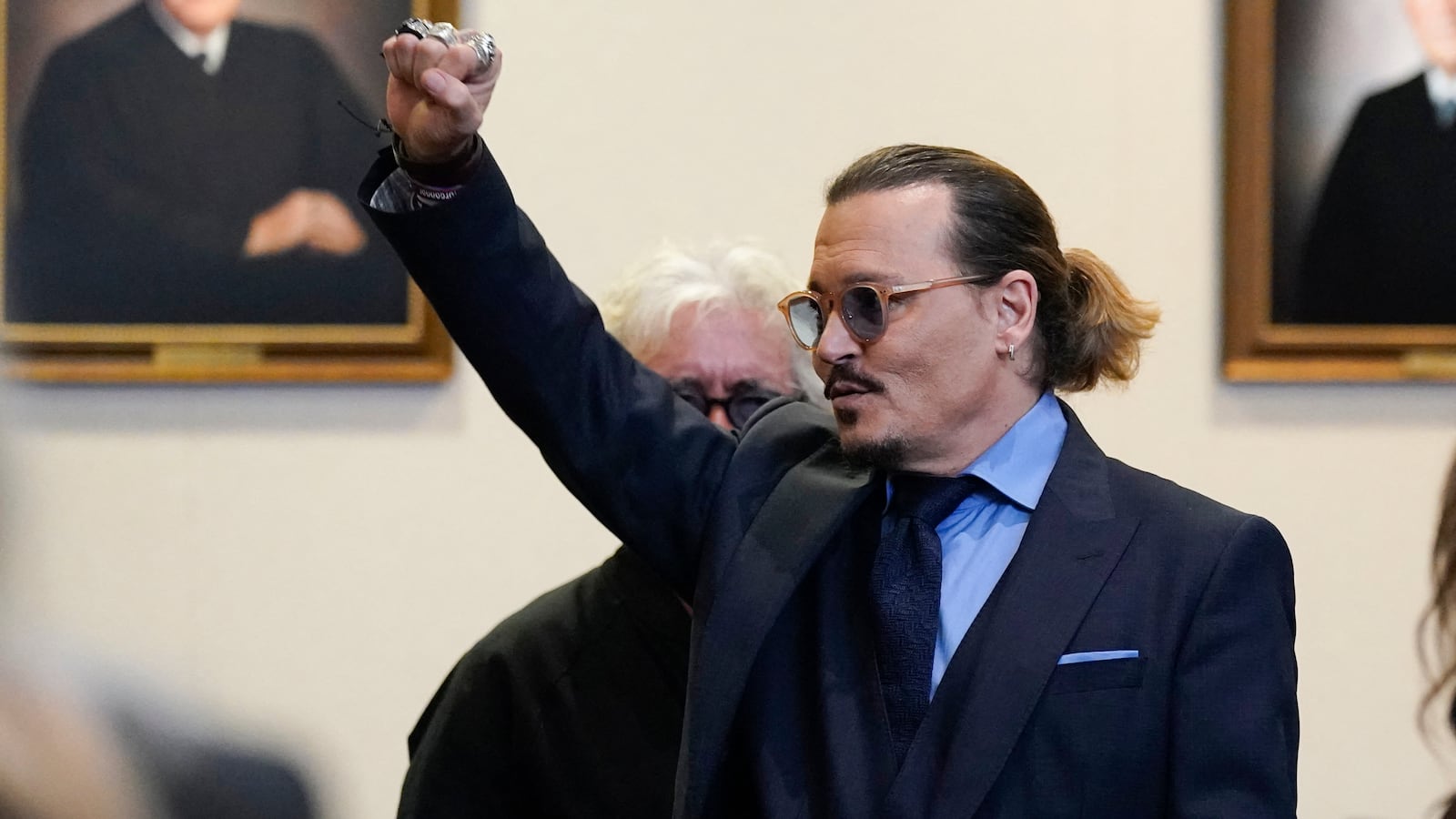Amber Heard defamed Johnny Depp when she wrote an op-ed identifying herself as a domestic abuse survivor, a jury found on Wednesday, bringing a close to the alternately disturbing and surreal Virginia trial that pitted the divorced Hollywood couple against each other.
But the jury also found that Depp defamed the actress when his ex-attorney described her claims about him abusing her as a “hoax.”
The verdict, reached in about 13 hours, marked the end of a case that dwelled on lurid allegations of repeat violence and damaged careers, and polarized public opinion about both actors. A British judge previously found “overwhelming” evidence Depp physically assaulted Heard repeatedly and left her in fear for her life.
Jurors had to decide whether Heard acted with actual malice in penning a 2018 Washington Post op-ed—meaning the actress knew what she had written was false—or that she published the piece with reckless disregard for the truth. While the op-ed does not name Depp, it did come two years after Heard filed a temporary restraining order against her ex-husband. Heard wrote that “two years ago, I became a public figure representing domestic abuse, and I felt the full force of our culture’s wrath for women who speak out.”
The jury did, in fact, find evidence of actual malice and awarded Depp $10 million in compensatory damages. But they also found in Heard’s favor on count two of her counter-claim, awarding the actress $2 million in compensatory damages.
As the verdict was read, Heard looked down at the table with her mouth trembling, while Depp was in the United Kingdom rather than the courtroom. A source close to Depp said the actor was not present because of “previously scheduled work commitments made before the trial.”
Following the verdict, Heard released a statement expressing her “disappointment” about the trial’s outcome.
“I’m heartbroken that the mountain of evidence still was not enough to stand up to the disproportionate power, influence, and sway of my ex-husband,” she said.
She called the verdict a “setback” for other women that “sets back the clock to a time when a woman who spoke up and spoke out could be publicly shamed and humiliated. It sets back the idea that violence against women is to be taken seriously.”
“I believe Johnny’s attorneys succeeded in getting the jury to overlook the key issue of Freedom of Speech and ignore evidence that was so conclusive that we won in the U.K.,” she added. “I’m sad I lost this case. But I am sadder still that I seem to have lost a right I thought I had as an American—to speak freely and openly.”
Depp released his own statement after the verdict stating that the “jury gave me my life back” and that he was “truly humbled.”
“My decision to pursue this case, knowing very well the height of the legal hurdles that I would be facing and the inevitable, worldwide spectacle into my life, was only made after considerable thought,” Depp added. “I am and have been overwhelmed by the outpouring of love and colossal support and kindness from around the world. I hope my quest to have the truth be told will have helped others, men or women, who have found themselves in my situation, and that those supporting them never give up.”
Throughout the seven-week proceeding that captivated America, Depp’s lawyers argued that the op-ed built on false abuse claims that preceded it. They echoed language by one of the actor’s former attorneys, Adam Waldman, who described Heard’s claims as a hoax despite significant supporting evidence. Waldman, who represented Depp in the unsuccessful British libel suit that featured many of the same witnesses, was also the basis of Heard’s counter-lawsuit against her ex-husband.
In that $100 million counter-lawsuit, Heard alleged that the Pirates of the Caribbean actor—using Waldman as a mouthpiece in the press—defamed her with the “hoax” claims, and then enlisted an online mob of Depp super-fans to vilify her and sabotage her career, flooding social media with anti-Heard bile.
The verdict followed weeks of testimony from dozens of witnesses called by both sides—friends, former friends and lovers, relatives, employees, and dueling experts in everything from post-traumatic stress disorder to cell phone picture metadata. It included two stints on the stand each for Depp and Heard, who sparred with lawyers, emotionally recounted their relationship that officially ended in 2017, and accused the other of domestic violence.
What unfolded on the stand was an American royalty horror story with accounts of intimate violence, household warfare, and garish living beyond most people’s means—including Depp’s. The couple’s tormented relationship paralleled the decline of Depp’s stature as perhaps the most bankable male actor in movies.
On the stand, the actors offered wildly different accounts of their relationship, which began after the pair met on the set of the 2011 film The Rum Diary. They married in February 2015. In May 2016, Heard filed for a temporary restraining order after an incident at their downtown Los Angeles apartment, where she said Depp threw a phone at her in one just instance of a pattern of abuse.
“I knew I had to leave him. I knew I wouldn’t survive if I didn’t,” Heard said during her first time on the stand.
For his part, Depp described himself as a victim of domestic violence, saying he was subjected to verbal and physical abuse by Heard. Heard denied those allegations, saying the only time she hit Depp was to defend herself or her sister, Whitney Henriquez.
Depp and Heard both discussed several incidents they said defined their relationship while on the stand, but vastly differently. They included a fight in Australia in 2015 where Depp said Heard severed his fingertip and Heard said her ex-husband sexually assaulted her with a liquor bottle; a fight over Depp’s “Wino Forever” tattoo that Heard claims was the first time her ex hit her; and who, exactly, was responsible for feces left on the couple’s bed in 2016.
“Either she is telling the truth, including in her most extreme allegations, or she is lying,” Camille Vasquez, one of Depp’s lawyers, told jurors during closing arguments on Friday.
Audio played at the trial appeared to show Depp indicating he had chopped his own finger off, and captured an admission to his head-butting Heard. The audio was one of several examples Heard’s lawyers used to argue that Depp was a “monster” who not only abused his wife, but oversaw an effort to destroy her career after their divorce.
“In Mr. Depp’s world, you don’t leave Mr. Depp,” Heard lawyer J. Benjamin Rottenborn said last week. “If you do, he will start a campaign of global humiliation against you.”









